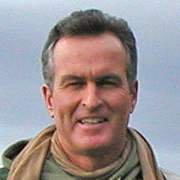Some friends of ours from Pennsylvania stopped by for a visit the other day. The husband is an electrical engineer, now retired, who devotes his time to helping municipalities alleviate light pollution, which prevents us from seeing the night skies as our ancestors did.
coincidence, I had just finished reading “One Square Inch of Silence” by Gordon Hempton and John Grossman (Free Press, Division of Simon & Schuster Inc., 2009), about one man’s quest for the preservation of natural soundscapes (no man-made noise) in the national parks.
The author points out that light and noise pollution go hand in hand. If one is looking for a quiet spot, an almost impossible task, one place to start is a map of relatively dark areas of the continent.
Some of these “dark” areas coincide with small holes in the network of air traffic lanes. The operative word is “small,” since there is virtually nowhere free of the noise of high altitude flights every few minutes. The most one can hope for right now is a window of silence, when the natural voice of the world can be heard for a few moments.
In Maine, as elsewhere in the nation, the focus, if any, has been on loud, annoying, ear-damaging noise, such as that emitted by motorcycles with altered, or no, mufflers. Other noise sources that can rapidly damage one’s hearing are gunshots (a single loud explosion can do the trick), rock concerts, leaf blowers, car boom boxes, jet takeoffs and landings, and iPods. A device that would track sound volume and warn the owner of possible hearing loss — there’s an app for that — has been developed, but the iPod manufacturers don’t seem interested.
Hearing damage can lead to tinnitus, “ringing in the ears,” as the brain tries to compensate for the missing stimulus. Persistent tinnitus, which affected the composer Smetana, has been known to cause suicide.
Maine police chiefs take note: altering motorcycle mufflers is a federal crime, even though the law is never enforced. One problem may be that motorcycle cops often ride illegal machines themselves. As Schopenhauer pointed out, the ignorant equate noise with power.
For a while in the 1970s, before budgets were slashed under the Reagan administration, the EPA took noise abatement seriously. This mandate is now virtually non-funded. During this brief period, however, many in-depth studies were published, and educational programs about the harmful effects of noise were begun across the country.
They make interesting reading, because hearing damage, although serious and widespread, is not the only deleterious effect of noise at any level above the volume of human speech. (I am not using decibel levels in this column deliberately, because one of the problems with anti-noise campaigns is that the logarithmic decibel scale is widely misunderstood and often used to obscure obvious harm.)
Noise levels not high enough to cause hearing loss have been shown to substantially reduce worker productivity, set learning back a grade, and increase the frequency and severity of stress-related illnesses. They isolate us from the natural world… and they may be helping to destroy it.
I have often written about bird song and the “dawn chorus” in this column. The sharp decline in songbird populations in recent decades has begun to mute its effect.
There are many environmental reasons for the decline, but one of them may be noise. As ambient noise levels get louder, birds can no longer rely on their calls to guard a territory, attract a mate or warn of danger.
In human beings, noise creates a vicious cycle, in which the victim ramps up the sound level to compensate for hearing loss, which causes further hearing loss. How many of us have heard the sound of a butterfly’s wing, a brook several miles away, a pine needle falling to earth, or the different songs each tree sings in the wind?
It’s probably too late for most of the adults on this planet, but children could be re-educated to think of silence as sexy. I remember the old Rolls Royce ads where “the only sound you hear at 60 miles per hour is the ticking of the clock.” The violent, perfectly quiet acceleration of an electric Tesla, for example, could create a new paradigm. I hope so.
In the meantime, I wish Gordon Hempton the best of luck with the FAA in preventing fly-overs of national parks. He’ll need it.
Christopher Hyde is a writer and musician who lives in Pownal. He can be reached at: classbeat@netscape.net
Send questions/comments to the editors.



Success. Please wait for the page to reload. If the page does not reload within 5 seconds, please refresh the page.
Enter your email and password to access comments.
Hi, to comment on stories you must . This profile is in addition to your subscription and website login.
Already have a commenting profile? .
Invalid username/password.
Please check your email to confirm and complete your registration.
Only subscribers are eligible to post comments. Please subscribe or login first for digital access. Here’s why.
Use the form below to reset your password. When you've submitted your account email, we will send an email with a reset code.